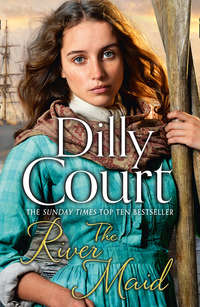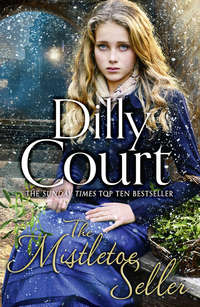
Полная версия
Nettie’s Secret
Nettie shrugged and sighed. It seemed that nothing would ever change her father; he would go through life oblivious to the chaos he caused along the way. Perhaps all creative people were like that. She could only be glad that she had not inherited her father’s artistic temperament, and she thought longingly of the blank pages in her notebook that begged to be filled with her next attempt at the novel. Maybe she would set it in Paris, or it might be a story about life on the river – that was a chapter just waiting to be told. She dragged her thoughts back to the present, wondering what Aristide was saying to Byron. They were having a long conversation, and it was obvious that Byron struggled at times in his attempt to understand Aristide’s rapid French. Then they shook hands and Aristide strolled off to speak to Robert.
‘What did he say?’ Nettie asked eagerly. ‘How are we going to pay our way? We can’t expect him to provide transport and feed us for nothing.’
‘Aristide had a youth who crewed for him, but the boy became ill and he had to send him home to his parents. I told the old man that I know nothing about sailing a barge, but he says he needs someone to stoke the boiler and work the locks. He said we can all help in one way or another.’
‘I’ll be happy to cook or clean, but doing hard physical work is a bit different from sitting in a law office copying dull documents,’ Nettie said, frowning. ‘Do you think you’re up to it?’
‘It’s true that I’ve never done manual labour, but we need to get away from Paris and I want to find my mother’s family, so this seems to be the best solution all round.’
‘I’ll do what I can to help,’ Nettie said, smiling. ‘Pa will do what he always does, which is as little as possible, but I suppose I shouldn’t grumble. It was his gift with people that made Monsieur Durand offer to help us.’
‘And it was your father who got you into this mess in the first place.’
‘Yes, I know, and it’s a shame that you’ve been dragged into our affairs.’
Byron took her hand and held it in a firm grasp. ‘I knew what I was getting into, and I wanted to come to France. It was my choice.’
‘I hope we find your mother’s family, but meeting them for the first time might not be easy. After all, they turned their backs on her.’
‘I’ve thought it through and I want to find out where I came from, whether it’s good or bad. I just need to know.’
‘I understand, or at least I think I do.’
He smiled and squeezed her fingers. ‘We’re in this together, Nettie.’
‘Byron, mon ami.’ Aristide was suddenly active, marching towards them, waving his arms and shouting instructions.
Byron leaped to attention. ‘We’re off, Nettie.’ He caught the mooring line that was thrown to him from one of Aristide’s friends on the river bank. He was attempting to coil the rope when Aristide hurried up to them, and showed him how it was done. He spoke rapidly and Nettie had no idea what he was saying, but it was obvious that she was the subject of the conversation.
‘He wants to show you where he does the cooking,’ Byron said at last. ‘I think you’re to take over.’
‘That’s one thing I can do.’ Nettie nodded to Aristide, who grinned in response and headed off in the direction of the accommodation in the stern of the vessel.
Every effort had been made to use the available space, from the bench seat that pulled down into a bed, to the rows of pots and pans that hung above the tiny stove. Talking volubly and miming with dramatic gestures, Aristide managed to demonstrate what he wanted her to prepare. A large soot-blackened pan was already on the stove and when he lifted the lid the aroma of onions and garlic wafted round the cabin, but when he produced a bucket filled with live eels Nettie had to clamp her hand over her mouth to stifle a cry of horror.
Aristide seemed to find this hilarious and his round belly shook with laughter. He pulled down a flap, which suddenly became a table, and he took a cleaver from the drawer and snatched a wriggling eel from the water.
Nettie backed away, shaking her head. ‘No, Monsieur. No, I can’t do that.’ She reached the door and stepped up onto the deck, gasping for air.
‘What’s the matter?’ Robert hurried towards her. ‘You’ve gone green, girl. Are you ill?’
‘No, Pa. He wants me to kill an eel and cook it.’
‘Is that all? I used to do it all the time when I was a boy. We used to set eel traps in the Thames at night and have fried eel for breakfast next morning.’ Robert pushed past her and stepped down into the accommodation. ‘Hold on, Aristide, my friend. You must forgive my daughter, she’s been brought up to be a lady, but this is something I can do.’
Nettie remained on deck until her father reappeared, wiping his hands on a bloodied cloth. ‘How satisfying. I feel like a man of the river now.’
‘I couldn’t do it, Pa. What’s happened to the eels?’
‘They’re skinned and cut up and stewing nicely in the liquor. If only he had some parsley to add to it and some mashed potato. We’ll have to do with bread. Luckily Aristide bought some fresh this morning. I’ll leave the rest to you, dear.’ He patted her on the cheek and sauntered off, edging past the smoke stack, which was now puffing clouds of black smoke into the atmosphere as the engine creaked and groaned into action. Aristide erupted from the cabin, giving Nettie a cheery wink as he returned to take over the tiller from Byron, who was looking distinctly nervous.
Nettie was equally apprehensive and she returned to the stove, but the debris had been cleared away and the eels were simmering gently in the pan. She had to brace herself in order to taste the liquor for seasoning, but it was surprisingly pleasant and the slimy eels had been transformed into meaty white chunks. She set the table, sliced the bread and waited for the eel stew to finish cooking.
That night Nettie, her father and Byron slept on deck beneath the stars. Aristide supplied them with blankets, pillows and a tarpaulin in case it rained, but Nettie was so tired that it would have taken a violent thunderstorm to rouse her. She awakened next morning to a chorus of birdsong and the gentle plashing of the water against the hull. It had been dark when they tied up for the night, but now in the gentle light of dawn she could see that they had left the city and were in a rural setting. Trees were just bursting into leaf and cattle grazed on lush green grass, while fluffy white lambs frolicked, jumping and leaping as if for joy. Born and bred in the city, Nettie was enchanted to find herself in the countryside with air that smelled fresh and sweet, in complete contrast to the noxious, smoky fumes in the city. She scrambled to her feet, taking care not to disturb her father and Byron, who were still sleeping peacefully. Her gown lay neatly folded on top of a hatch cover and she slipped it over her head. If they were to travel far on the waterways of France they would need to make better sleeping arrangements, especially in the way of cover in case of bad weather. She buttoned her bodice and sat down to put on her boots. If Aristide was up and about she could put the kettle on and make coffee, although she would have loved a cup of tea, and perhaps she could toast what was left of yesterday’s bread. She made her way towards the stern, but came to a sudden halt at the sight of Aristide, naked as the day he was born, apart from his peaked cap, boots and a red and white spotted neckerchief. He was standing on the deck, staring out over the fields with a plume of tobacco smoke rising above his head. He turned to look at her and smiled, taking the pipe from his mouth.
‘Bonjour, Mademoiselle.’
‘Er, good morning, Monsieur Durand.’ Nettie averted her eyes. ‘Breakfast,’ she said tentatively. ‘Coffee.’
He said something in rapid French, laughed and strolled off towards the cabin. Nettie followed at a distance, trying not to look at the vast expanse of pink flesh wobbling along in front of her.
‘Byron,’ she called in a hoarse whisper. ‘Wake up, please.’ But there was no sound from where her father and Byron were sleeping and she had little choice other than to follow Aristide into the accommodation. She hung back as long as possible, and when she eventually set foot in the cabin she was relieved to see that he had pulled on a pair of baggy trousers. He indicated the stove, and she could feel the heat from the doorway. A kettle was bubbling away and he pointed to a coffee grinder and a bag of beans. Nettie knew then what she must do, and she edged past him to make a start on the coffee.
He was talking to her as if she understood what he was saying and, to keep him happy, she nodded in what felt like the right places and shook her head when he paused, eyeing her expectantly. It seemed to work, and he tapped the dottle from his pipe, refilled it from his tobacco pouch and lit it with a spill from the fire. He sauntered out on deck, slipping on his shirt and leaving a trail of smoke in his wake. Nettie heaved a sigh of relief and concentrated on making a pot of coffee, and toasting the bread left over from last night’s supper on the hob. The aroma of toast and coffee must have filtered out on deck as Byron was the first to appear, followed by Robert. Both looked bleary-eyed, but Nettie suspected that it was due to the rough red wine they had consumed rather than a lack of sleep.
Nettie sat on the bench, sipping the strong black coffee. ‘We’ve left Paris and we’re headed north, is that right, Pa?’
Robert bit into a slice of dry toast and pulled a face. ‘I want some butter and marmalade.’
‘You haven’t answered my question.’
‘Yes, dear. You know we had to leave Paris.’
‘Of course, and we’re trying to find Byron’s family as well as making sure that Constance is happy to be with Duke, but what then?’ Nettie looked from one to the other. ‘When we reach Beauaire, where do we go from there? Are we going back to England, or are we going to become water gypsies and go on to Le Havre with Monsieur Durand?’
‘I haven’t quite decided,’ Robert said vaguely. ‘It depends on whether the police have given up the chase. I can’t think that they would waste their time hunting for someone like me. It’s not as if I’ve committed murder or treason.’
‘So we might be going home?’
Robert picked up his cup and drank thirstily. ‘We’ll see.’
‘I’d better go back on deck.’ Byron made a move towards the doorway. ‘According to Aristide, we’re nearing a lock and that’s where I have to leap into action. I haven’t the slightest idea what to do, so it should be interesting.’
Nettie followed him out into the warm spring sunshine. ‘Everything moves so slowly on the river. We might be on this barge for weeks, so will you teach me to speak French? It will make things much easier.’
A slow smile lit Byron’s eyes. ‘Of course I will, and I’m sure that Aristide will co-operate fully. He’s not a bad chap when you get to know him.’
Nettie stifled a giggle. ‘I saw rather more of him that I wanted to this morning. He was standing in the bows, smoking his pipe and staring at the view with nothing on.’
‘You mean he was undressed?’
‘Exactly, although he was wearing his neckerchief and his cap.’
Byron’s lips twitched but his brow was creased in a frown. ‘I should speak to him. It’s not the done thing when there’s a young woman on board.’
‘You can’t tell him what to do on his own barge.’
‘He would be mortified if he knew you’d seen him naked.’
‘He saw me and he wasn’t at all embarrassed. I’ll just try to avoid him tomorrow morning. Anyway, I know now what to do for breakfast, and maybe we might have the opportunity to go ashore at some point. He must buy food from somewhere and there’s precious little in any of the cupboards.’
Nettie was about to return to the cabin when Byron caught her by the hand.
‘You don’t have to trail around after your father. Say the word and I’ll take you back to England. You’re not involved in Robert’s crimes.’
‘He’s my father, Byron. You’ve seen how he is, and heaven knows what would happen to him if I went home. I can’t desert him.’ Nettie withdrew her hand, giving him an apologetic smile. ‘You’re a good friend, Byron. I’m so glad you came with us.’
‘I do care about you, Nettie,’ he said slowly. ‘You must know how I feel about you.’
This time her smile was wholehearted. ‘I do, and it’s wonderful to have such a good friend.’ She stood on tiptoe to brush his cheek with a kiss. ‘Oh, heavens,’ she added, sniffing the air. ‘Someone has burned the toast and we were already low on bread.’ Without giving Byron a chance to respond Nettie returned to the cabin to find her father staring glumly at a slice of charred bread.
‘That’s the last of the bread, Nettie. Remind Aristide to buy some when we go ashore, although heaven knows when that will be. The fellow chatters away, but I haven’t the slightest idea what he’s saying.’ Robert took his pad and tin of charcoal from the shelf where he had placed them the previous evening. ‘I’m going out to sketch the view. Charming countryside – I think I could quite happily live in France for the rest of my days.’ He hesitated in the doorway. ‘I believe Aristide has a consignment of wine in one of the holds, and grain in the other. This is the life, my dear. I might have been born to it.’
He wandered out onto the deck, leaving Nettie to clear away the mess he had created.
Having tidied the cabin, swept the floor and the deck, Nettie found herself with nothing to do other than sit and admire the scenery. Aristide was at the tiller and Byron was kept busy stoking the boiler and cleaning the hatch covers, while Robert sat in the stern, sketching and sometimes dozing in the warm sunshine. Nettie found a secluded spot and took out her notebook. She sat for a while, chewing the end of her pencil as she tried to think of a suitable title for this new novel, and in the end she simply wrote Belinda, which was the name of her wayward heroine. Then she started to write.
Writing about the trials of the beautiful but headstrong young woman, Nettie lost track of time, but was brought back to reality by a sudden jolt as the barge bumped gently against the river bank.
‘This isn’t the time to be writing your diary,’ Robert said impatiently. ‘I’m going ashore with Aristide. Are you coming?’
Nettie tucked her book and pencil down behind a sack filled with grain and jumped to her feet. ‘Yes, Pa.’ She hitched up her skirts and reached out to take Byron’s hand as he leaned over from the top of the river bank. It was muddy and difficult to find a foothold but eventually she reached safety. The heroine of her book, Nettie decided, would break with convention and wear men’s breeches when she travelled by barge. The story would mirror her own experiences and therefore would be much more believable than a gothic fantasy. She was determined to make the publishers sit up and take notice of her. The adventures of Belinda Makepeace would captivate readers, and the public would queue up to buy her books.
‘Where are we?’ Nettie shielded her eyes from the sun, but they seemed to be on the edge of a wood and straight ahead there were fields filled with grazing cattle, stretching as far as she could see. They were in the middle of the country with no sign of habitation. ‘Why have we come ashore here, Pa?’
‘I don’t know.’ Robert scratched his head. ‘I need a straw hat. If we were near a town I could purchase one to protect my head and neck from the sun.’
Nettie turned to Byron. ‘There doesn’t seem to be anything here.’
Byron held up his hand. ‘Listen. That sounds like music.’
‘Music?’ Robert put his head on one side, closing his eyes. ‘Sylvan sounds. It might be fairy folk.’
‘Pa!’ Nettie said, laughing. ‘You’ve been drinking too much of the wine that Aristide hands out so liberally.’
Aristide had been standing a little apart from them, but he became animated, shouting instructions to Byron, who leaped back onto the boat and pulled back the hatch covers.
The music grew louder. Nettie could hear singing and the voices sounded very human. A flight of startled birds erupted from the wood and the music swelled, twigs snapped underfoot, and, one thing was certain – the newcomers were not fairy folk. Nettie waited, barely daring to breathe as the hubbub rose in a crescendo …
Chapter Six
Aristide stood with open arms as the crowd burst from the darkness into the bright sunshine, their costumes ablaze with colour, curls flying, hands clapping in time to a fiddler and the beat of a drum.
‘What on earth is going on?’ Nettie whispered into her father’s ear. ‘Where did all these people come from?’
Robert grasped her hand. ‘I’ve no idea, but Aristide seems to know them. Smile, Nettie. Stop looking scared.’
She bared her teeth in an attempt at a grin. ‘I’m not frightened, Pa. I’m amazed to think that these people knew we were here, but I don’t understand why they are so pleased to see us.’
‘It’s Aristide they love,’ Robert said in a low voice. ‘We’d best keep out of the way.’ He stepped aside as the crowd of men, women and children converged on the river bank.
Aristide was at the front, holding up his hands for silence. Then, with a surprisingly athletic move for a man of his age and build, he leaped on board, and, in answer to their names being called, the onlookers stepped onto the barge, laying their contributions on the deck in return for a large bag of grain and as many bottles of wine as they could carry.
Nettie watched in awe as the gifts of bread, vegetables, meat, fruit, cheese and milk piled up on deck, and then the party began. Bottles were uncorked and Nettie found herself being offered a drink by a burly, bewhiskered French farmer. She refused at first, but realising that she had offended him, she took the bottle and held it to her lips, sipping just enough to be sociable. This seemed to be the sign that she was willing to dance with him and he whirled her around in time to the music. Soon everyone was dancing, even the small children, and the older men and women sat round chatting like old friends who had not seen each other for some considerable time.
Byron had come ashore and Nettie made the excuse of being too breathless to keep dancing, miming in a desperate attempt to convince her new beau that she needed to rest. She moved swiftly to Byron’s side, and the frolicking farmer seized another girl round the waist and danced off with her into the wood.
‘What’s going on?’ Nettie had to raise her voice to make herself heard over the noise.
‘Aristide visits here once a month, so he told me. These people come from outlying farms and it’s quite a social event.’
Nettie chuckled and nodded. ‘Yes, I can see that. But I thought he was transporting the wine from a vineyard to a wholesaler. That’s what Pa told me, and the grain is for a distillery in Le Havre.’
‘They’ll get what’s left after Aristide either drinks or barters it away. It seems to be the accepted way of life, or the way he runs things. Right or wrong, they’re all having a wonderful time.’
‘I think that pretty girl with the scarlet blouse is eyeing you, Byron. It looks as though you’ve made a conquest.’
He backed towards the edge of the bank. ‘Maybe I’d better get on board and put some of that food away before it goes off in the heat of the sun.’
‘I thought you’d be flattered,’ Nettie said, chuckling. ‘She is very attractive, Byron.’
‘I’m not a lady’s man,’ he muttered. ‘I’ve never known what to say to women.’
Nettie stared at him in surprise. ‘But you’ve never had a problem with talking to me.’
‘You’re different.’ He lowered himself onto the deck and began scooping up the perishable goods.
Nettie was about follow him when another young man tapped her on the arm. He was a year or so her junior at a guess, but he smiled shyly and she could not disappoint him by refusing to dance. As they galloped around, clapping in time to the beat of the drum, and kicking up their heels, Nettie could see that her father had taken advantage of the situation. He had retrieved his pad and charcoal and was sketching the villagers as they drank, danced and enjoyed themselves. One elderly farmer sat for his portrait and paid for it in tobacco, and another, emboldened by his friend, had his likeness sketched in exchange for his straw hat.
Nettie danced with her young admirer, but the language barrier made communication difficult, and then she was claimed by an older man with straying hands. His breath reeked of garlic and he was very drunk, but she managed to put him in his place without creating a scene, and by that time people had begun to drift away. Nettie took this as her cue to say adieu to the ageing Lothario and she joined Byron on board the barge.
‘That was a surprise,’ she said, chuckling. ‘I wonder if this will happen every time we set ashore.’
Byron picked up a sack of potatoes and slung it over his shoulder. ‘It seems to work for old Aristide, and Robert has got the hat he wanted, even if it is a bit battered.’ Byron sniffed the air as a cloud of blue smoke wafted their way. ‘But that tobacco your father is smoking smells terrible.’
Nettie glanced at her father, who was seated in his favourite place, the straw hat pulled down over his eyes as he smoked his pipe and sipped wine from a bottle. Aristide was still on the river bank, bidding a fond farewell to a voluptuous woman, who was obviously more than a passing acquaintance. With one last, lingering kiss, he released her and backed away, blowing kisses, while a youth, who bore a striking resemblance to Aristide, looked on with a disapproving scowl. Aristide stepped on board the barge, turning to wave as the boy grabbed his mother by the hand and dragged her away.
Nettie’s fertile imagination was hard at work as she tried to imagine a young, handsome Aristide falling in love with the raven-haired country girl. Perhaps their families had opposed the match, like the Capulets and Montagues in Romeo and Juliet, but Nettie abandoned the idea almost immediately. Aristide was not a romantic hero, and, from what she had just witnessed, he was illegally bartering the goods he had been entrusted to deliver. Aristide, she decided, was just as much on the wrong side of the law as Pa, and if the French police were to take an interest in his activities, Pa, Byron and herself would be in even more trouble. She glanced at her father, who looked happier than she had seen him in a long time, and she knew that he would laugh off her worries.
‘We’re leaving now, Nettie.’ Byron stepped ashore to release the mooring rope and he tossed it to her, jumping on board as the barge started to drift towards mid-channel.
Drunk as he was, Aristide took the tiller and Byron went to stoke the boiler. The engine chugged into life and, once again, they were headed downstream.
Nettie picked up the last of the food they had been given and stowed it away safely before starting to prepare the evening meal. The meat and vegetables would make a savoury stew that would cook slowly all afternoon, ready to eat in the cool of the evening. She would have time to find a secluded spot and concentrate on the trials of Belinda, her wilful heroine, and her search for true love.
A routine developed, with each day more or less the same. They all had their duties to perform, even Robert, whose job it was to sweep the deck, which he did in a half-hearted way before retiring to the bows to make even more sketches or snooze in the sunshine, his new hat pulled down over his eyes. In the evenings, when they were moored in a sheltered spot, Aristide and Robert sat and smoked their pipes after supper and drank wine, while Byron gave Nettie lessons in French. When it was fine they went ashore and walked along the river bank, but when it rained they either huddled in the cabin, or sat beneath a tarpaulin that Byron had rigged up over their sleeping area. Nettie was beginning to enjoy life as a bargee, but she could not rid herself of the nagging fear that one day the police would descend upon them and arrest both her father and Aristide.






